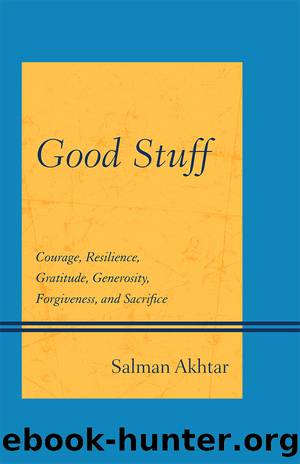Good Stuff by Akhtar Salman M.D

Author:Akhtar, Salman, M.D. [Akhtar, Salman]
Language: eng
Format: epub
Publisher: Jason Aronson, Inc.
Published: 2012-12-12T05:00:00+00:00
CONCLUDING REMARKS
Caring is an attitude, not necessarily anything one does. It is a form of interest in another human being that has its roots in the parents’ phase-specifically adequate attitudes towards their children at the latters’ changing developmental stages. —Tahka, 1993, p. 345
In this contribution, I have delineated normal and abnormal forms of generosity while acknowledging that often the psychodynamic and behavioral features of the two overlap. I have noted these hybrid constellations and sought to demonstrate that shifting identifications and relational pressures on the love-hate economy of psyche can impact upon the presence, type, and extent of generosity. Unlike Kradin (1999) who declared the analyst’s generosity to be “a cardinal therapeutic factor in analysis” (p. 223), I have taken a less euphoric view of this component. While acknowledging its important role in creating respect for the patient’s essential Otherness, I have underscored that the ways in which issues involving generosity affect our day-to-day clinical work are myriad, nuanced, and complex.10 However, even such broad-based coverage has left some aspects of the topic unaddressed. In what follows, I will briefly touch upon these matters with the awareness that many questions will remain unanswered.
The first issue is that of the relationship between age and generosity. While my elucidation of its development has established that rudimentary forms of altruism and generosity are evident from the earliest periods of life, it is unclear when exactly mature generosity (with the associated capacities for whole object relations and empathy) finds ego expression. Are there real differences between children’s and adult’s generosity and if so, are these quantitative (i.e., more or less) or qualitative (i.e., with different sorts of pleasure) in nature? Does the adolescent’s bouts of ‘hyper-generosity’ toward certain peers or social causes reflect a caricature of adult altruism or is it the last flicker of selflessness which is put off by the move toward conventionality in young adulthood? What effect does the onset of middle age have on generosity? Is “generativity” (Erikson, 1950), i.e., the capacity to nurture the next generation in a self-less manner, merely a form of generosity or are the two phenomena different? Clearly, more thought is needed here.
The next issue pertains to gender. Most studies of philanthropic patterns across genders (see Mesch, 2009, for critical review of this literature) reveal that women are more likely to give money to humanitarian causes, though a few investigations have found the opposite. For a psychoanalyst, however, the mere act of giving is not a sufficient indicator of true generosity; people donate money for all sorts of reasons (e.g., guilt, exhibitionism) which have little to do with generosity. More impressive, therefore, are studies (Hoffman, 1977; Winterich et al., 2009) that find women to be more charitable, more empathic, and, psychologically speaking, more generous. Fascinatingly, this was also found to be true for men with high scores for “feminine gender identity.” Observations of such sort lend support to the idea that empathy is predominantly a maternal trait (Greenson, 1975). They also suggest that, regardless of
Download
This site does not store any files on its server. We only index and link to content provided by other sites. Please contact the content providers to delete copyright contents if any and email us, we'll remove relevant links or contents immediately.
Inner Engineering: A Yogi's Guide to Joy by Sadhguru(6785)
The Power of Now: A Guide to Spiritual Enlightenment by Eckhart Tolle(5757)
Fear by Osho(4727)
Ikigai by Héctor García & Francesc Miralles(4247)
The Art of Happiness by The Dalai Lama(4125)
The Ultimate Bodybuilding Cookbook by Kendall Lou Schmidt(3938)
Yoga Therapy by Mark Stephens(3742)
The Little Book of Hygge by Meik Wiking(3687)
The Healing Self by Deepak Chopra(3568)
Why Buddhism is True by Robert Wright(3446)
The Hatha Yoga Pradipika (Translated) by Svatmarama(3328)
Being Aware of Being Aware by Rupert Spira(3272)
Shift into Freedom by Loch Kelly(3194)
Wild Words from Wild Women by Stephens Autumn(3149)
Work Clean by Dan Charnas(3116)
Happiness by Matthieu Ricard(3040)
More Language of Letting Go: 366 New Daily Meditations by Melody Beattie(3023)
Yoga Body & Mind Handbook by Jasmine Tarkeshi(2874)
Why I Am Not a Feminist by Jessa Crispin(2748)
